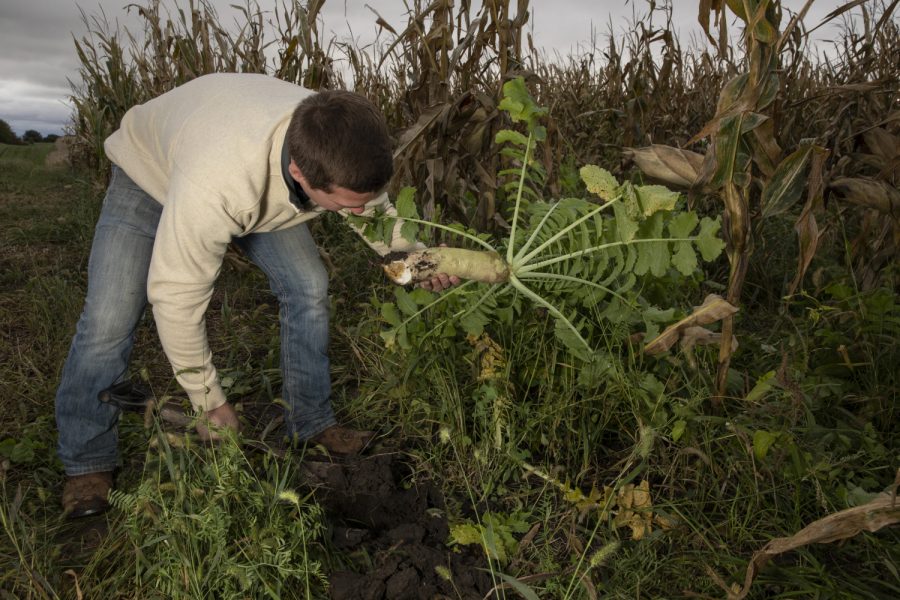Farmer and Agricultural Consultant Mitchell Hora holds a tillage radish near his field on Oct. 11. Radishes are one of several cover crops planted to promote soil health in Hora’s fields.
Guest Opinion: Seventh-graders take on ag issues
A pair of junior-high students from North Liberty write on big issues they care about.
November 7, 2019
End world hunger
One of the privileges of being American is that relative to the rest of the world, we don’t suffer with hunger. Yet, 1 billion people go hungry every day. Yeah, that’s a big number. And 6 million children die from hunger each year. Every five seconds a child dies from hunger-related causes. This translates to 25,000 young lives lost every day day from hunger.
We throw away 40 percent of our food in America while 54 nations do not produce enough food to feed their people. We produce enough food for everyone, yet 1 billion people remain hungry.
We are fortunate to have so much land to produce food. Yet, in Iowa we have all this beautiful and rich soil, but we are losing 100 farms a month. And in the past 60 years, Iowa has lost over 100,000 farms.
Some ways we can help end world hunger are waste less food, buy local food, and buy fair trade. You can even talk to restaurants about offering local food, too. And we should do everything possible to save Iowa’s fertile farmland. There are so many ways we can end world hunger. You can do one of these things and see that it has a big impact on hunger.
— Tasha Schepanski, North Central Junior High School seventh-grader
Stop factory farming
I think that everyone should hear the truth about factory farming. Most people go to the store not thinking about how some food can be so cheap and where it’s made. The answer is factory farming.
You may ask, why is factory farming so bad? It does have advantages, such as high efficiency and cheap animal products, but it also has disadvantages. Factory farms can create health hazards because animals are over-crowded and require a lot of antibiotics. This makes it easier for disease to spread.
Also, when thousands of beef cattle are packed into feedlots full of manure, bacteria can get on their hides and then into the slaughterhouses. The faster an animal is processed or the more milk an animal produces, the more profitable the operation. Approximately two-thirds of all beef cattle in the U.S. are given growth hormones, and approximately 22 percent of dairy cows are given hormones to increase milk production.
Animals suffer under these conditions, and I don’t think it’s alright for the animals to be treated this way.
Also, climate stability is greatly affected by factory farms, with 37 percent of methane emissions coming from factory farming.
We don’t have to be eating in a way that does harm to animals and the environment. We do have alternatives to factory farming: We can buy local food, support local farmers, buy fair trade products, raise awareness about hunger and farming systems, and talk to stores and restaurants about offering local foods.
We still have hope; we just need more people to support sustainable farming. I hope you start thinking more about the impact of the food you eat.
— Kamila Swanson, North Central Junior High School seventh-grader
